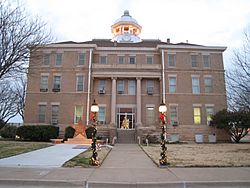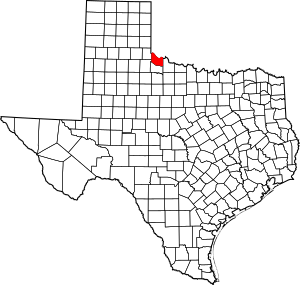Hardeman County, Texas facts for kids
Quick facts for kids
Hardeman County
|
|
|---|---|

The Hardeman County Courthouse in Quanah
|
|

Location within the U.S. state of Texas
|
|
 Texas's location within the U.S. |
|
| Country | |
| State | |
| Founded | 1884 |
| Seat | Quanah |
| Largest city | Quanah |
| Area | |
| • Total | 697 sq mi (1,810 km2) |
| • Land | 695 sq mi (1,800 km2) |
| • Water | 1.8 sq mi (5 km2) 0.3% |
| Population
(2020)
|
|
| • Total | 3,549 |
| • Density | 5.092/sq mi (1.9660/km2) |
| Time zone | UTC−6 (Central) |
| • Summer (DST) | UTC−5 (CDT) |
| Congressional district | 13th |
Hardeman County (/ˈhɑːrdɪmən/ HAR-di-mən) is a county located in the U.S. state of Texas. As of the 2020 census, its population was 3,549. The county seat and largest city is Quanah. The county was created in 1858 and later organized in 1884. It is named for two brothers, Bailey Hardeman and Thomas Jones Hardeman, early Texas politicians and legislators. Hardeman County was one of 46 prohibition or entirely dry counties in the state of Texas until November 2006, when voters approved referendums to permit the legal sale of alcoholic beverages for on- and off-premises consumption.
Contents
Geography
According to the U.S. Census Bureau, the county has a total area of 697 sq mi (1,810 km2), of which 695 sq mi (1,800 km2) are land and 1.8 sq mi (4.7 km2) (0.3%) are covered by water.
The Prairie Dog Town Fork Red River joins with Buck Creek in the northwestern corner of the county to form the Red River, which flows east to form the northern border of the county, separating it from Oklahoma.
Hardeman County is the northernmost county in Texas that is not part of the Texas Panhandle.
Major highways
Adjacent counties
- Harmon County, Oklahoma (north)
- Jackson County, Oklahoma (northeast)
- Wilbarger County (east)
- Foard County (south)
- Cottle County (southwest)
- Childress County (west)
Demographics
| Historical population | |||
|---|---|---|---|
| Census | Pop. | %± | |
| 1880 | 50 | — | |
| 1890 | 3,904 | 7,708.0% | |
| 1900 | 3,634 | −6.9% | |
| 1910 | 11,213 | 208.6% | |
| 1920 | 12,487 | 11.4% | |
| 1930 | 14,532 | 16.4% | |
| 1940 | 11,073 | −23.8% | |
| 1950 | 10,212 | −7.8% | |
| 1960 | 8,275 | −19.0% | |
| 1970 | 6,795 | −17.9% | |
| 1980 | 6,368 | −6.3% | |
| 1990 | 5,283 | −17.0% | |
| 2000 | 4,724 | −10.6% | |
| 2010 | 4,139 | −12.4% | |
| 2020 | 3,549 | −14.3% | |
| U.S. Decennial Census 1850–2010 2010 2020 |
|||
| Race / Ethnicity (NH = Non-Hispanic) | Pop 2000 | Pop 2010 | Pop 2020 | % 2000 | % 2010 | % 2020 |
|---|---|---|---|---|---|---|
| White alone (NH) | 3,731 | 2,938 | 2,441 | 78.98% | 70.98% | 68.78% |
| Black or African American alone (NH) | 227 | 217 | 130 | 4.81% | 5.24% | 3.66% |
| Native American or Alaska Native alone (NH) | 27 | 15 | 14 | 0.57% | 0.36% | 0.39% |
| Asian alone (NH) | 12 | 12 | 18 | 0.25% | 0.29% | 0.51% |
| Pacific Islander alone (NH) | 0 | 0 | 1 | 0.00% | 0.00% | 0.03% |
| Other race alone (NH) | 2 | 1 | 7 | 0.04% | 0.02% | 0.20% |
| Mixed race or Multiracial (NH) | 40 | 67 | 120 | 0.85% | 1.62% | 3.38% |
| Hispanic or Latino (any race) | 685 | 889 | 818 | 14.50% | 21.48% | 23.05% |
| Total | 4,724 | 4,139 | 3,549 | 100.00% | 100.00% | 100.00% |
As of the census of 2000, 4,724 people, 1,943 households, and 1,319 families were residing in the county. The population density was 7 people/sq mi (2.7 people/km2). The 2,358 housing units averaged 3 units per square mile (1.2/km2). The racial makeup of the county was 85.4% White, 4.8% African American, 0.8% Native American, 0.3% Asian, 7.1% from other races, and 1.6% from two or more races. About 14.5% of the population were Hispanic or Latino of any race.
Of the 1,943 households, 29.9% had children under the age of 18 living with them, 54.7% were married couples living together, 10.4% had a female householder with no husband present, and 32.1% were not families. About 29.5% of all households were made up of individuals, and 18.0% had someone living alone who was 65 years of age or older. The average household size was 2.40, and the average family size was 2.97.
In the county, the population distribution was 25.40% under the age of 18, 7.50% from 18 to 24, 22.60% from 25 to 44, 24.30% from 45 to 64, and 20.20% who were 65 years of age or older. The median age was 41 years. For every 100 females, there were 89.40 males. For every 100 females age 18 and over, there were 85.2 males.
The median income for a household in the county was $28,312, and for a family was $33,325. Males had a median income of $26,683 versus $18,566 for females. The per capita income for the county was $16,824. About 14.6% of families and 17.8% of the population were below the poverty line, including 26.0% of those under age 18 and 13.4% of those age 65 or over.
Economy
Georgia-Pacific operates a gypsum plant in the small community of Acme, located 6 miles (9.7 km) west of Quanah on U.S. Highway 287.
Attractions
- Copper Breaks State Park, which is operated by the Texas Parks and Wildlife Department, is located in far southern Hardeman County near the Pease River just off State Highway 6, about 12 miles (19 km) south of Quanah. The park features a portion of the state Texas Longhorn herd.
- Lake Pauline is located off U.S. Highway 287, 6 miles (9.7 km) east of Quanah.
Communities
Cities
- Chillicothe
- Quanah (county seat)
Unincorporated communities
- Goodlett
Ghost towns
Education
School districts serving sections of the county include:
- Childress Independent School District
- Chillicothe Independent School District
- Quanah Independent School District
The county is in the service area of Vernon College.
See also
 In Spanish: Condado de Hardeman (Texas) para niños
In Spanish: Condado de Hardeman (Texas) para niños

